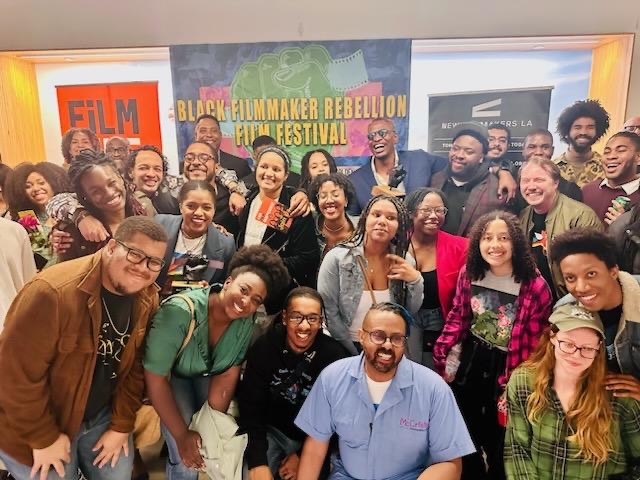
- Interviews
The Black Filmmaker Rebellion Emerges from a White Campus
Inspired by L.A. Rebellion – the film movement that started at the University of California Los Angeles (UCLA) and brought together Black film students from the late 1960s to the late ’80s in adopting cinema as a poetic expression for the African-American experience – a group of Loyola Marymount University (LMU) Black film students felt compelled to revive the link between the art form and their reality.
The Black Filmmaker Rebellion Film Festival was born in 2023 at the LMU campus as a way to “give Black students a place to land,” explained the chief organizer McCristol Harris in a recent Zoom interview with HFPA. “It’s not about what we are doing now, it’s about what comes afterwards. There’s a small population of Black students here at LMU, and within the film school it’s even a smaller population. So, we have come together as a way for us to network, to build stories, and hopefully to leave something behind so that the students that come after us have something to build on … and [so that] we can come back as professionals and contribute to the students, to the school, and the Black community here.”
At first, it appears to be strange that an homage to L.A. Rebellion would come out from LMU, a private Jesuit school. “People come from a lot of privilege at our university and we wanted something [through which] we could come together. We wanted to be united within our own race.”
The idea worked and the organization has given Black LMU students the opportunity to expand their network beyond the bounds of their school. Attesting to this fact is the Black Filmmaker Rebellion Film Festival, a one-day cross-campus showcase of Black students’ work which took place on April 27, 2023, in collaboration with Film Independent. The event gathered film students and industry professionals.
On a deeper level, the formation of the Black Filmmaker Rebellion is driven by the will to create a legacy, similar to the legacy of L.A. Rebellion. “Maybe we can be as influential as the [L.A. Rebellion] filmmakers, as brave in our work and diverse in our voices… it’s something to aspire towards.”
Rather than connoting a polemic attitude, this group’s “rebellion” consists of asserting themselves and their storytelling. “We want to create a type of poetry within our work,” said the organizer. “Some students struggle when they try to fit things into the narrative three-act structure. They’d rather express themselves poetically … Let’s include these voices… [it] is what we hope for.”
“We have experiences here at school where you are in a white room with a white professor, and they want to change things in your story,” he added. “[Through Black Filmmaker Rebellion] you can get a different perspective that includes the Black voices. We try to support that within our student body.”
When asked about his take on the overall state of diversity in America, McCristol didn’t sound all too excited: “[It’s] the same recycling of things that I’ve experienced in my entire life … I hope that there is some attention in this area that will make a little progress but we won’t see it for some years … It’s a tough question because we are talking about systems that are in place within this country that are not going to be easy to dismantle. I don’t see that happening in my lifetime.”
Even though there has been a shift in Hollywood toward the inclusion of Black perspectives, the organizer stressed that “we need to see more [diverse] producers, directors and writers.”
“It’s interesting,” he went on, “you turn on the television and you see diversity within the cast, but if you go on the set [you will see] older white men still being department heads in the majority. They want us to think that they are more inclusive. That’s the image that they are putting out … [When] the behind-the-scenes changes and looks more like my world – I have friends from all over the place, all colors, all genders – then… it will be different.”

